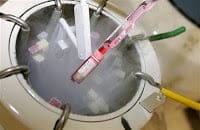Cryopreservation – Egg, Embryo and Sperm Freezing
Wordwide, in all reputable IVF Centres, cycle eggs are frozen in the same way. In our centre, pregnancy rates via our egg freezing-thawing program are almost the same as using fresh eggs.
Due to career planning and living conditions, many women plan marriage and childbirth towards older ages. However, as it is a well-known, both in natural ways and in IVF treatment a woman’s age is very critical. The older the woman, the less the chance of getting pregnant. Today, thanks to egg freezing (egg cryopreservation) programs, eggs collected after a short period of stimulation of the ovary can be stored for long years and when a woman thinks of getting pregnant these can be thawed and used. No matter what age the woman will be by the time she decides to get pregnant, her eggs will be frozen in the condition when they were retrieved.
Eggs are a complex and huge structure and they are delicate to low temperatures. During the first researches in the area, pre-mature eggs (oocyte) were suggested to be frozen, however, today, research shows that mature eggs are more durable in the process of freezing. After collection, eggs are cleansed of the surrounding cells and normal/healthy mature eggs are frozen.
When freezing, the timing of reducing the temperature and using the appropriate preservative agent is vital. After the eggs are frozen, they are placed into liquid nitrogen (-196°C). Eggs stored in liquid nitrogen can be kept safe without genetic deformation for a long time. In babies, born of frozen-thawed eggs, no defects related to this process have been encountered so far. In initial trials about 60% of the eggs could survive after they were thawed, however, this rate has reached 80%-90% now. In addition, lower percentages of pregnancy, after thawing the eggs, at the beginning, have been highly increased due to the use of microinjection.
Who can benefit from egg freezing/egg cryopreservation?
- Women who plan to have children at later ages (due to career plans, not thinking of getting married at an early age etc.)
- Those who will receive cancer treatment such as chemotherapy or radiotherapy; who will have to have their ovary removed but will be able to keep their uterus can benefit from egg freezing before these procedures, and, after they complete their treatment, they can have a chance of pregnancy.
- Patients with a risk of developing hypersitmulation during IVF treatment ( in this method the eggs are frozen and a a few months later they can be transferred through microinjection).
- Couples, when for some important reason (emergency health or work related issue) the male partner cannot be present to provide the sperm during egg collection, can benefit from this process.
In short, whatever the reason is (medical or personal etc.), today, thanks to this highly successful program, women have the chance to freeze their eggs.
Freezing Sperm
This is a program which has been highly effective since the of IVF. There is no difference in the percentages of pregnancies which involve frozen-thawed sperm and those that involve the use of fresh sperm in our clinic.
Sperm freezing is suitable …
- Before surgical operation/chemotherapy/radiotherapy regarding male reproductive organ related tumors,
- Prior to radiotherapy/chemotherapy due to any sort of tumor existence which might affect the production of sperms
- When there is a critical deformation in the sperms or as a precaution in cases where there is a risk of having no sperm at all in the future
- When for some important reason (emergency health or work related issue) the male partner cannot be present to provide the sperm during egg collection
Freezing Embryo
After embryo transfer to the patient, the excess embryo (which should be in good condition) can be frozen and stored via vitrification with the consent of the couıple. In this way, we are able to transfer embryos without stimulating the ovaries. We get very successful results via vitrification. When compared to slow and traditional freezing methods, embryos get less damage in this technique and pregnancy rates have similar results to cases where non-frozen embryos are used.
Who might benefit from embryo freezing?
- Patients who have excess good quality embryo after embryo transfer,
- Patients who have a high risk of hyperstimulation (when the ovary responds more than necessary and thus transfer is postponed to a later date) during an IVF procecudre,
- Patients who for some reason (chemotherapy or radiotherapy against cancer, or any other urgent medical procedure) need to postpone transfer to a later date can make use of frozen embryos. In such cases, after thawing the frozen embryos, transfer can be possible.



